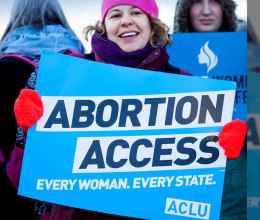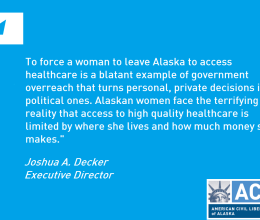Today, the Alaska Supreme Court heard oral arguments in Planned Parenthood Great Northwest, Hawai‘i, Alaska, Indiana, Kentucky v. State of Alaska, a case that will determine whether qualified advanced practice clinicians (APCs) — including nurse practitioners, physician assistants, and certified nurse midwives — can continue providing abortion care in Alaska. Since November 2021, APCs have safely provided medication under a preliminary injunction and have safely provided aspiration abortion since the trial court granted a permanent injunction to Planned Parenthood.
Today’s argument follows the state’s appeal of a 2024 Superior Court ruling that struck down Alaska’s physician-only abortion restriction as unconstitutional as applied to APCs. The lower court concluded the ban violated the fundamental rights of Alaskans to privacy and equal protection under the Alaska Constitution because the restriction imposed medically unnecessary barriers to care without justification. The provision of abortion by APCs expands access to this essential care by increasing the pool of qualified providers who are able to provide abortion care. Whereas medication abortion was only available one day a week prior to the preliminary injunction, Planned Parenthood has been able to offer medication abortion appointments every day its health centers are open since APCs have been able to provide medication abortion.
“Today’s arguments are a reminder of what is at stake for the people of Alaska,” said Rebecca Gibron, CEO of PPGNHAIK. “The state’s vast geography and severe health care shortages already make it difficult for people in Alaska to access timely, essential care. Qualified clinicians are ready and able to provide abortion services safely. The State’s efforts to block them only deepen long-standing inequities and unnecessarily endanger patients.”
“We’re defending the Superior Court’s ruling today because it affirmed Alaskans’ rights to privacy and equal protection, including the right to make personal health care decisions without the government standing in the way,” said Lu-Anne Haukaas-Lopez, Deputy Executive Director for the ACLU of Alaska. “The Alaska Supreme Court now has an opportunity to uphold those essential constitutional protections for all Alaskans, no matter where we live.”
Allowing APCs to provide abortion care is particularly critical in Alaska, where:
- Nearly one in three women live in a borough without an abortion provider
- More than 80% of the state’s land is inaccessible by road, forcing many to travel hundreds of miles for care
- Persistent health care workforce shortages have left entire regions without accessible reproductive health services
Across the United States, patients regularly rely on APCs for reproductive and other essential health care. These clinicians hold advanced degrees and safely perform a wide range of services, including abortions. APCs also play a crucial role in providing health care in underserved areas, such as rural Alaska, and provide the majority of women’s health care nationwide.
Yet, in Alaska, a 1970 state law requires that only licensed physicians provide abortions. Those who violate this law are subject to penalties of up to five years in prison or a fine of up to $1,000.
In 2019, Planned Parenthood Great Northwest, Hawai’i, Alaska, Indiana, Kentucky filed this lawsuit to finally end this unnecessary and harmful law. The organization is represented by Planned Parenthood Federation of America, Stoel Rives, the ACLU of Alaska, and Legal Voice. Camila Vega, a senior staff attorney at Planned Parenthood Federation of America, argued on behalf of PPGNHAIK.
Following today’s hearing, the Alaska Supreme Court will issue a written opinion in the months ahead. Planned Parenthood health centers in Alaska remain open and continue to provide the full spectrum of reproductive health services, including abortion access.






